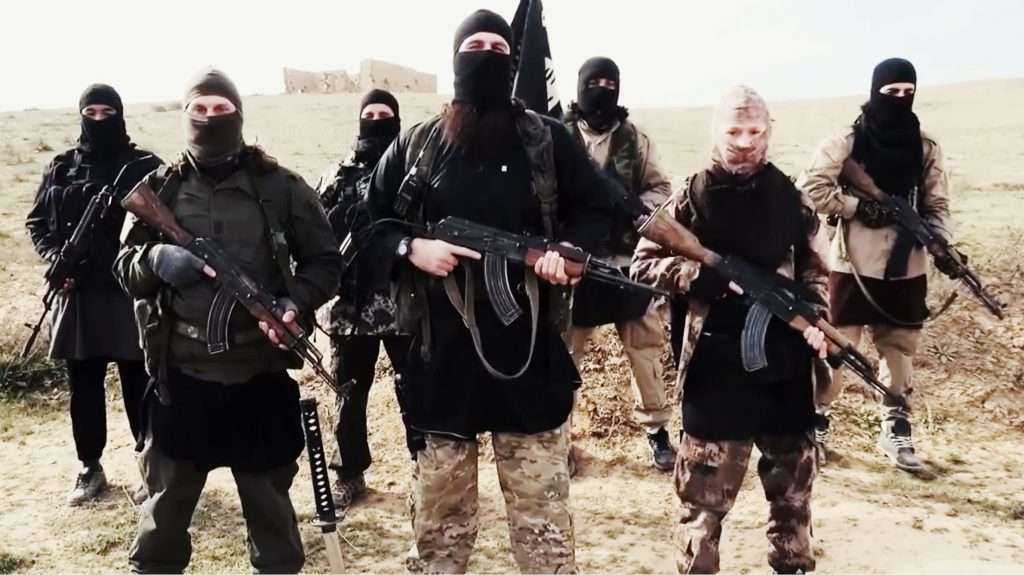After years of cooperation, hostility between al-Qaeda and ISIS, the Islamic State in Iraq and Syria, has escalated in the African Sahel region, experts say according to France 24 Report published late Friday.
The two terrorist organizations have previously existed in different sites of conflict, including Syria, but they often worked side by side in the African Sahel region through coordinating attacks and even exchanging fighters.
The semi-desert region has been living in years for a struggle against extremist fighters who first appeared in northern Mali in 2012, before they spread to the center of the country and reached neighboring Burkina Faso and Niger.
[caption id="attachment_68987" align="aligncenter" width="1024"] ISIS Militants[/caption]
ISIS Militants[/caption]
This has resulted in the deaths of thousands of soldiers and civilians so far and the displacement of hundreds of thousands from their homes.
But since the beginning of the year, 2020, it appears that sporadic confrontations between al-Qaeda and ISIS have escalated into major battles in central Mali and Burkina Faso.
Little detail was leaked about this conflict between the two terrorist organizations, and a large part of it occurred in troubled regions where criminal organizations and ethnic militias are active and witness regular confrontations with the regular armies.
Local experts and officials point to differences in the sphere of influence and access to agricultural crops, which is one of the reasons for the fighting between them.
On his part, the U.N. special envoy in Mali, Mohammed Saleh Al-Nazif, said that the civil war between the terrorists "was no longer a secret."
"We don't know how it will end," he added, referring to their battle over the territories. "Each party wants to have the upper hand over the other."
Al Qaeda-linked extremists appeared in northern Mali in 2012 and then moved to the center of the country in 2015, and they are now part of the Jama'at Nasr al-Islam wal Muslimin.
The presence of ISIS is more recent. The jihadist Adnan Abu Walid Al-Sahrawi founded the group in the region in 2015 and is currently active in the border areas between Mali, Burkina Faso and Niger.
Al-Qaeda, ISIS Conflict: Non Ideological Reasons As Well
A declared coalition between Al Qaeda and the Islamic State has never formed in the Sahel, according to a Western diplomat in the capital of Mali, Bamako.
However, he considered that this did not prevent them from working closely, referring to joint attacks and the movement of fighters from one organization to another.
[caption id="attachment_127097" align="aligncenter" width="800"] Al-Qaeda Militants[/caption]
Al-Qaeda Militants[/caption]
The diplomat added that what encourages a person to join one of the two organizations is mostly related to domestic motives, such as belonging to a marginalized ethnic group or unemployment.
On his part, Ibrahim Maiga, a researcher at the Institute of Security Studies in Bamako, considered that the causes of the conflict are also mostly local.
"These conflicts should not only be viewed from an ideological perspective," says Maiga.
Propaganda War Between Two Terrorist Organizations
Clashes between the two jihadist groups started after ISIS fighters crossed into a region in central Mali from Burkina Faso at the beginning of the year, according to a local official who declined to be named to the French news agency.
He added that the fighters had moved "from village to village, spreading their message."
In neighboring Burkina Faso, ISIS claimed that its operatives had killed "more than 35" members of the Jama'at Nasr al-Islam wal Muslimin group near the Mali’s borders.
In turn, the United Nations, in a recent internal report, referred to a "lack of intelligence" about several regions in Mali.
Likewise, al-Qaeda or ISIS did not release any tape about the confrontations between them, which is unusual in the activities of the media-active extremist organizations.












